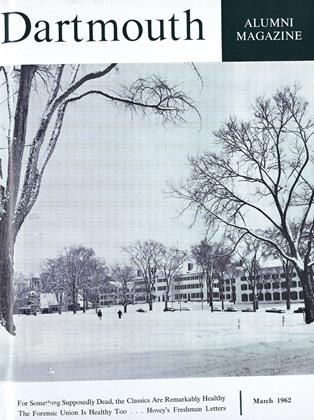SARTORIAL DECLINE?
TO THE EDITOR:
In the February column of The Undergraduate Chair I was rather surprised to read that class jackets have fallen out of favor with the present undergraduates. This brief note brought to mind a scene observed by my wife and me during a visit to Hanover last spring. We observed that warmup jackets, with huge letters advertising Dartmouth on the back, were worn by just about every undergraduate in sight, leaving the impression that Hanover resembled a training camp for some major league baseball team, rather than a New England college town.
What has changed the favor from class jackets, tennis sweaters, and sport coats to baseball warmup jackets? The clothing merchants can only cater to the demands and tastes of their clientele, so we cannot attribute it to them. I can only believe in the theory that there is a direct correlation between the sophistication of the admissions yardstick and the sartorial tastes of the student body. If this be so, let's not sell short the IQ's of our former classes; let's revert to the larger percentage of prep school types in our freshman classes who once set the tone coveted in Hanover, as well as at other Ivy League schools, since baseball jackets over class jackets cannot be the choice of superior intellects.
New York, N. Y.
THE VOICE OF VOLTAIRE
TO THE EDITOR:
Even though Paul L. Zens '36 disagrees with the sentiments expressed in my December letter on admissions, I'm appreciative of his goodwill. I can use it - and I'm sure Dartmouth can too!
Differences of opinion, and particularly airing of them, are good for the soul and good for a better understanding amongst men.
Voltaire said, in effect, "I disagree with what he says but will fight to the death for his right to say it," and he was dead right.
It has been our experience down through the ages that disagreement and debate eventually bring about something approaching a meeting of minds - a compromise, if you will - and consolidated action resulting therefrom has been the backbone of our country's development. I like to think that the same applies to Dartmouth.
Support for the intellectual is as essential as for the football team and none of us wants to slight either. I tried to emphasize the "happy medium" in my previous letter and it is the "happy medium" I'm rooting for - whether it be in seeking material for higher academic degrees or for athletic excellence.
I was much interested in President Plimpton's report on his first year at Amherst and I interpret his emphasis on "seeking a variety of youth" as more or less synonymous with my "cross sectional" label. If Mr. Zens feels that "an intellectual cross-section of American youth will be disastrous," I, in turn, disagree with him most heartily.
Time will tell and I hope I'm around long enough to witness the result. In the meantime, in the immortal words of Joe Humphreys: "May the better man emerge victorious!"
New York, N. Y.
FAMILY RESEMBLANCE
TO THE EDITOR:
When I looked at the picture of John Ripley Wheelock on Page 18 of your February issue, I was struck by the resemblance to his great-great-grandfather, Eleazar Wheelock, whose portrait I have seen hanging in Parkhurst Hall. It is too bad you did not think to run the two Wheelocks side by side so this striking family resemblance, especially the nose, could be seen.
Hanover, N. H.
Editor's Note: The reprimand is deserved.The two pictures are belatedly printed here:
SUPERLATIVE RETRACTED
TO THE EDITOR
There are many superlatives which may properly be applied to the medical school at Harvard, but "by far the oldest" is not one of them. When it was founded in 1783, the School of Medicine of the University of Pennsylvania was about eighteen years old.
I am sure Dr. Lord has less desire than most people to cause old Dr. Shippen to revolve in his grave for a small slip of the pen in an otherwise excellent article in your February issue.
(M.D., U. of Penn. '45)
Springfield, Mass.
 View Full Issue
View Full Issue
More From This Issue
-
 Feature
FeatureTHE CLASSICS
March 1962 By NORMAN A. DOENGES -
 Feature
Feature...AND MANY DARTMOUTH YESTERDAYS
March 1962 By Edward Connery Lathem '51 -
 Feature
FeatureDartmouth's Debaters Are Arguing Themselves Into National Renown
March 1962 By HAROLD F. BRAMAN '21 -
 Feature
FeatureFund Goal: $1,250,000
March 1962 -
 Feature
FeatureTrustees and Councilors Hold a Combined Meeting
March 1962 -
 Feature
FeatureSome Members of the Board...
March 1962







